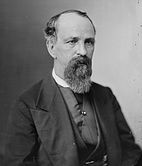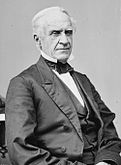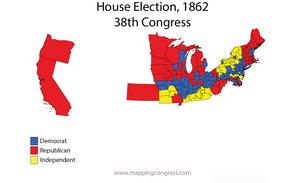United States House of Representatives elections, 1862
|
|
|||||||||||||||||||||||||||||||||||||||||||
|
|||||||||||||||||||||||||||||||||||||||||||
|
|||||||||||||||||||||||||||||||||||||||||||
|
|
|||||||||||||||||||||||||||||||||||||||||||
| Map of U.S. House elections results from 1862 elections for 38th Congress | |||||||||||||||||||||||||||||||||||||||||||
|
|||||||||||||||||||||||||||||||||||||||||||
Galusha Grow (defeated)
Republican
Elections to the United States House of Representatives were held in 1862, mostly in November, in the middle of President Abraham Lincoln's first term. His Republicans lost 22 seats in Congress, while the Democrats picked up 28, for a net swing of 50 seats (or 27 percent) out of a total House membership of 185.
The mid-term elections in 1862 brought the Republicans serious losses due to sharp disfavor with the Administration over its failure to deliver a speedy end to the war, as well as rising inflation, high new taxes, ugly rumors of corruption, the suspension of habeas corpus, the draft law, and fears that freed slaves would undermine the labor market. The Emancipation Proclamation announced in September gained votes in Yankee areas of New England and the upper Midwest, but it lost votes in the ethnic cities and the lower Midwest. While Republicans were discouraged, Democrats were energized and did especially well in Pennsylvania, Ohio, Indiana, and New York. Elated Democrats from the Northwest hailed the elections as a repudiation of the emancipation heresy.
The Republicans did keep control of the major states except New York. Most important, the Republicans retained control of the House, in spite of falling from 59% of the seats to just over 46% because of their alliance with the 24 Unionist representatives; the Unionists were a group of disaffected pro-war Democrats who broke with their party during the previous Congress. The voters, editorialized the Cincinnati Gazette, "are depressed by the interminable nature of this war, as so far conducted, and by the rapid exhaustion of the national resources without progress.".
...
Wikipedia




